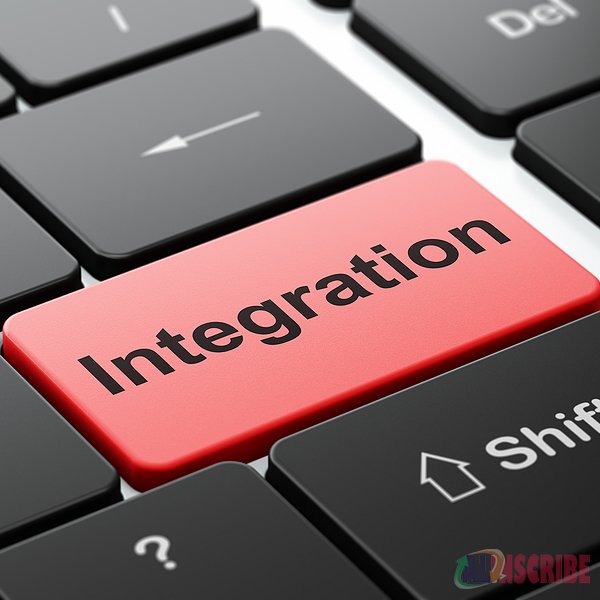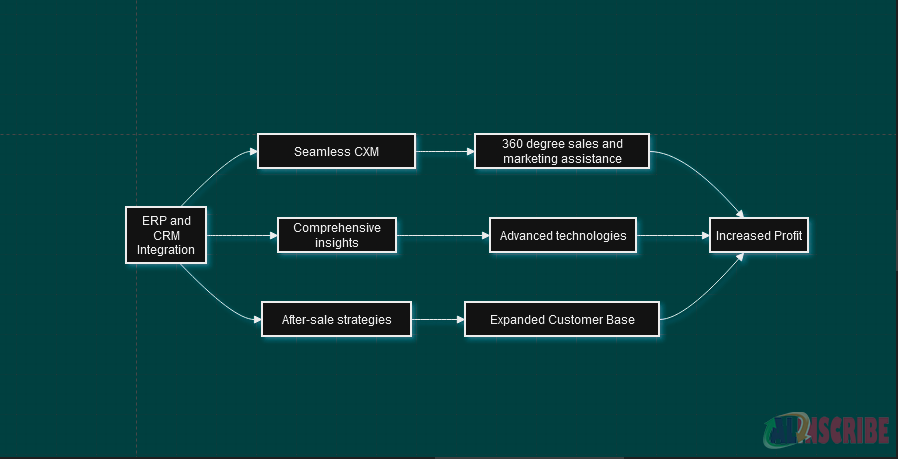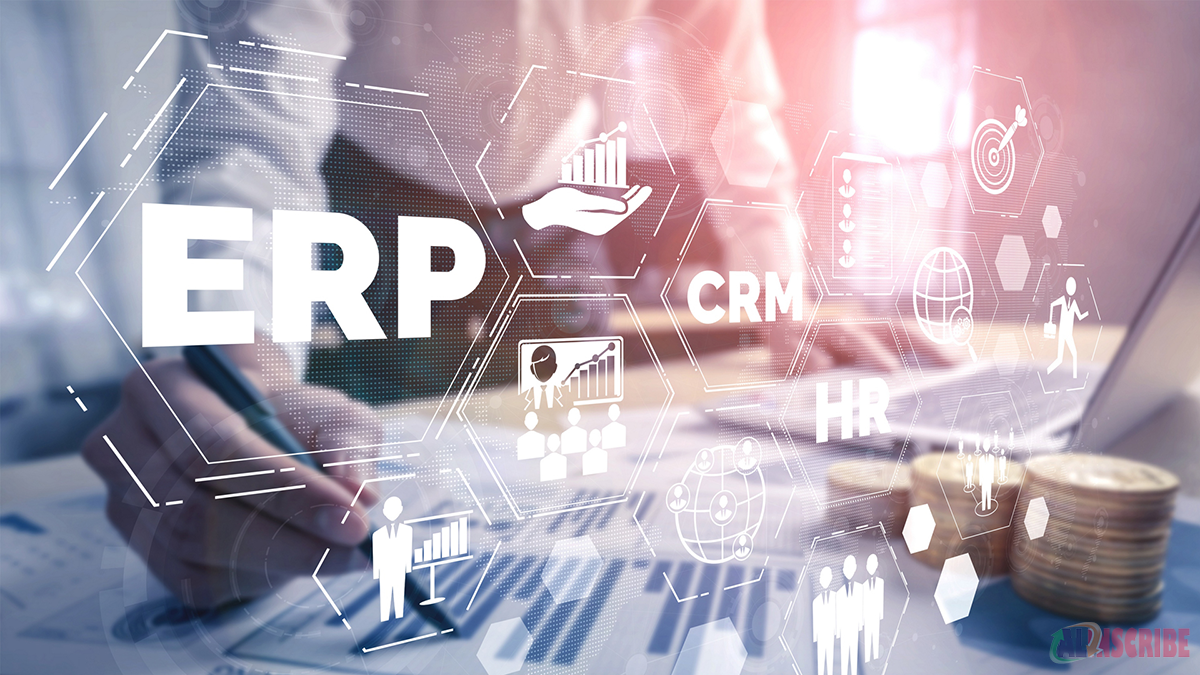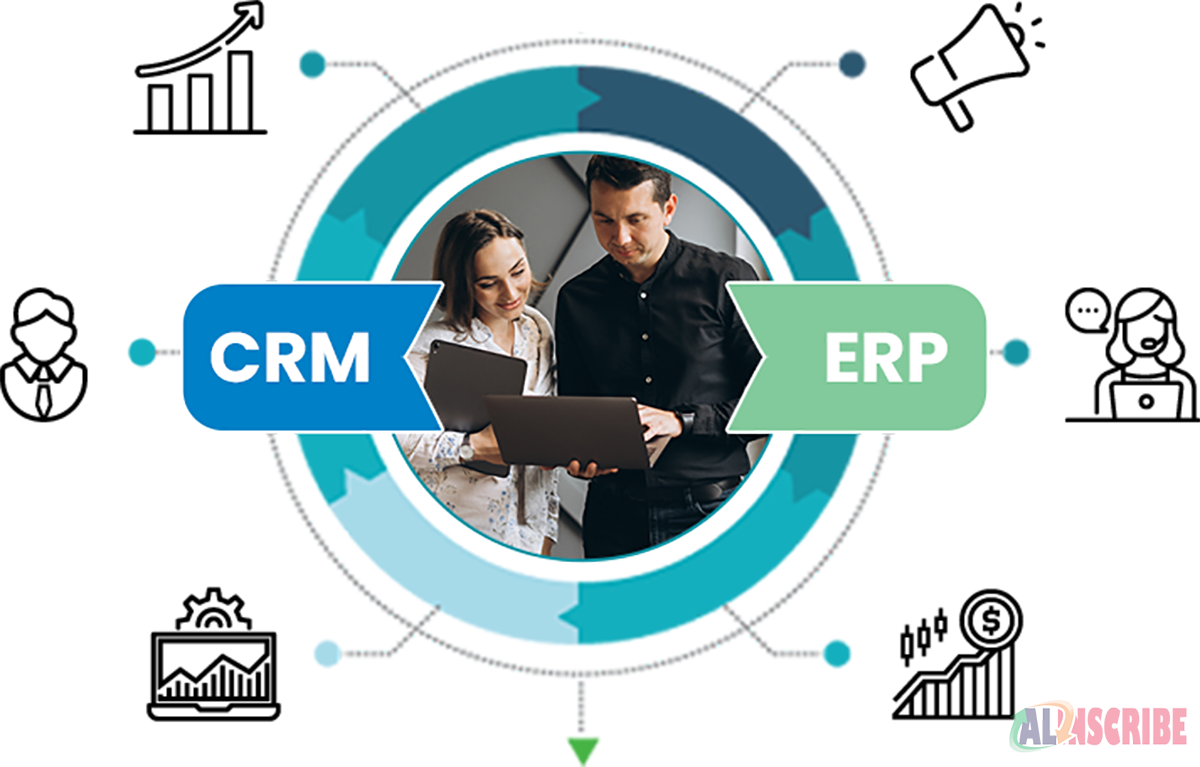5 Least Known Facts About ERP And CRM Integration That You Need To Know

Enterprise Resource Planning (ERP) and Customer Relationship Management (CRM) are two distinct, but interconnected software systems used in business operations. ERP systems handle internal processes such as inventory management, accounting, human resources, and supply chain management. CRM systems, on the other hand, focus on managing interactions with customers and prospects, helping businesses improve relationships and drive sales.
ERP and CRM integration is the process of connecting these two critical systems to enable the seamless flow of data and information between them. This integration facilitates a holistic view of your business operations, from internal processes to customer interactions, leading to better decision-making, improved customer service, and enhanced efficiency.
In this article, we will discuss 5 least known facts regarding ERP and CRM integration. Some benefits that can be gained by integrating ERP and CRM systems will be discussed as well. So, keep reading the article to uncover some information that you didn’t know about before.
ERP and CRM statistical insights
In this section of the article, we will discuss some statistical insights regarding ERP and CRM systems for establishing better understanding about the overall topic.
ERP related statistics
- ERP market is still in a phrase of rapid growth and is expected to exceed the market size of $49.5 billion by 2025.
- 53% of the business operators believe that ERP is an investment priority.
- 67% of the global ERP implementations are bound to be successful.
- 95% of businesses have reported to witness process improvement upon ERP implementation.
- 64% of the global ERP users use SaaS, 21% use cloud ERP and 15% use on-premises ERP systems.
CRM related statistics
- CRM market size is expected to reach $113.5 billion within 2027.
- 91% of the companies has at least one employee to use CRM technology.
- 97% of the sales professionals believe CRM systems are important for businesses.
- 32% businesses of service industry and 13% businesses of IT industry are looking forward to implementing CRM technology.
- Usage of cloud-based CRM has increased by 84% from 2010 to 2020.
The above statistics signify that both ERP and CRM technologies have been witnessing a good amount of growth in recent competitive market scenario. Hence, ERP and CRM integration can provide you with an upper hand in the course of your business.
5 facts about ERP and CRM integration
1. You will be entitled to seamless CXM
Most of the business operators seem to know that ERP and CRM integration enhances the entire customer relationship management process. The integration helps in smooth flow of customer data between the ERP and CRM system, which results in faster resolve of customer queries and issues.
However, many of us are unaware of the fact that ERP and CRM integration also promotes better CXM, Customer Experience Management as well. CXM or CEM is a system associated with marketing strategies as well as technologies which focus on customer engagement, experience and satisfaction. In simpler words, CXM establishes a wider viewpoint of CRM.
Enhancement of CXM stands for a 360 degree customer view with more customer engagement than you have ever experienced. When you opt for ERP and CRM integration, it will provide you with a chance of employing larger CXM goal as the unified platform becomes the appropriate technology to support the same.
The seamless data integrity is the primary factor that supports an enhanced CXM. It also allows the company to eliminate micro-management and establish a better and smoother maintenance process of customer experience.
2. You will gain 360 degree sales and marketing assistance
ERP and CRM integration stands for integrating sales and marketing approach with back-office processes. Marketing and sales strategies can earn their full potential only when those are backed up by the right back-office processes. ERP and CRM integration not only enhances data flow between two of the systems but also integrates back-office with customer management.
Additionally, if your company is looking forward to offering more customized and personalized services to your customer base, then you can employ the sales and marketing department to gather information on customer preferences. These data can be conveyed easily to the appropriate department without facing many difficulties. Only ERP and CRM integration can power a company to work so smoothly. Hence, you get 360 degree sales and marketing assistance without having to invest much of your time.
3. You can fuel up your profit by gaining comprehensive insights
ERP and CRM integration allows your business to have comprehensive insights via the automated processes and smooth flow of information. Comprehensive insights regarding the industry trends, customer preferences, and customer engagement can help you in determining better strategies, which can assist you in gaining more profit than ever.

4. You get a chance of working with the most advanced technologies
ERP and CRM integrated systems are one of the most advanced technologies and are often powered by AI (Artificial Intelligence) and ML (Machine Language). Working with these technologies mean you get to enjoy competitive advantages of accurate market predictions and decision marketing automation.
5. You can establish after-sale strategies
Right insights and error-free implementation of accurate strategies can allow you to gain a ton of benefits and profits when a product goes live in the market. But what after the sale? What are the next steps and what are the appropriate approaches that will help you in retaining your customers?
ERP and CRM integration has the answers. While ERP systems help in determining new ideas for new products, CRM systems record customer reactions and preferences and offers an insight regarding the steps that can be taken to retain as many customers as possible. The companies can also arrange alluring offers like customer loyalty points, customer forums, special discounts and so on. This is certainly beneficial for the companies which look forward to establishing a huge and loyal customer base for a long-term relationship.
What can be gained by ERP and CRM integration
Streamlined Data Flow
One of the primary benefits of ERP and CRM integration is the streamlined flow of data between the two systems. Instead of manually entering information into both ERP and CRM systems, data is shared automatically, reducing the risk of errors and ensuring that customer and business data remains consistent and up-to-date. For example, when a sales order is created in the CRM, the ERP system can automatically update inventory levels and generate an invoice, eliminating redundant data entry.
Comprehensive Customer Insights
Integrating CRM with ERP provides a 360-degree view of customer data. This comprehensive view includes not only contact information but also a customer's purchase history, preferences, outstanding invoices, and payment history. This rich dataset empowers businesses to tailor their services and marketing efforts more effectively. Sales and customer service teams can access this information to provide personalized support and identify upsell and cross-sell opportunities.
Enhanced Sales and Service
Sales teams can significantly benefit from ERP and CRM integration. With access to a complete customer profile, including past orders and interactions, sales reps can engage customers more effectively. They can identify opportunities to upsell or cross-sell products and services, improving revenue and customer satisfaction.
Furthermore, customer service teams gain access to essential order and billing information. When customers inquire about their orders or billing status, support agents can quickly access the information they need, leading to faster issue resolution and enhanced customer experience.
Efficient Order Processing
Integration between ERP and CRM streamlines the entire order-to-cash process. When a sales order is created in the CRM, the integration ensures that the order details are seamlessly transferred to the ERP system. This reduces order fulfillment times, minimizes errors, and ensures accurate billing and revenue recognition. Efficient order processing contributes to improved customer satisfaction and better financial management.
Inventory Management
Accurate inventory management is crucial for businesses that deal with physical products. An ERP and CRM integration enables businesses to maintain optimal inventory levels based on customer demand. For instance, when a sales order is placed in the CRM system, it can trigger automatic updates in the ERP system to adjust inventory levels. This automation prevents overstocking or understocking and ensures that products are available when customers need them, contributing to customer satisfaction and cost savings.
Financial Management
Financial data is a critical component of both ERP and CRM systems. Integrating these systems allows for a more complete view of customer financial information. For instance, when a sale is made in the CRM, it can trigger the creation of invoices in the ERP system. This integrated approach helps businesses assess credit risk, manage collections more effectively, and gain better insights into customer payment behavior.
Data Security
While the benefits of ERP and CRM integration are substantial, it's essential to prioritize data security. The integrated system should implement robust access controls and encryption to safeguard sensitive customer and financial data. Compliance with data protection regulations, such as GDPR or HIPAA, if applicable, should be a priority. Regular security audits and updates should also be part of the integration strategy to ensure ongoing protection.
Scalability
The needs of a business can change over time, and the ERP and CRM integration should be scalable to accommodate growth. Whether your business expands its product offerings, customer base, or geographic reach, the integrated system should adapt to handle increased data and transactions. A well-designed integration can grow with your business, preventing the need for costly re-implementations in the future.
Vendor Support and Integration Tools
Many ERP and CRM software vendors recognize the importance of integration. They often provide pre-built integration solutions or Application Programming Interfaces (APIs) to simplify the integration process. Leveraging these tools can save time and resources during the integration project. Additionally, third-party integration tools and consultancies specializing in ERP and CRM integration can offer valuable expertise and assistance.

Challenges in ERP and CRM integration
While ERP and CRM integration offers numerous advantages, it's not without its challenges. Here are some key challenges to be aware of:
Complexity
ERP and CRM systems are complex in their own right. Integrating them can be a complex and time-consuming process, often requiring the expertise of IT professionals or consultants.
Cost
Integration projects can incur significant costs, including software licenses, development, and ongoing maintenance. It's important to carefully budget and plan for these expenses.
Data Mapping and Transformation
ERP and CRM systems often use different data structures and terminologies. Mapping and transforming data from one system to another can be a complex task that requires careful consideration and thorough testing.
Customization
Each business has unique processes and requirements. Customizing ERP and CRM systems for integration may be necessary, which can add complexity and time to the project.
Change Management
Integrating systems often leads to changes in workflows and processes. Employees may need training and support to adapt to the new way of working.
System Updates
As both ERP and CRM systems evolve, it's essential to ensure that the integration remains compatible with the latest updates. This requires ongoing maintenance and possibly additional development work.
Data Security and Privacy
Integrating two systems increases the risk of data breaches. Security measures must be in place to protect sensitive customer and financial data.
Compatibility
Ensuring that the ERP and CRM systems are compatible, and that integration is possible can be a challenge. Not all software combinations are equally suitable for integration.
Vendor Dependence
Relying on software vendors for integration tools can lead to vendor lock-in. Businesses should carefully consider the long-term implications of this dependence.
ROI Assessment
It's essential to measure the return on investment (ROI) for the integration project. Determining whether the benefits outweigh the costs and effort is critical for business success.
Key Considerations for Successful ERP and CRM integration
To ensure a successful ERP and CRM integration, consider the following key factors:
1. Clear Objectives
Define clear objectives for the integration project. What specific goals do you aim to achieve, such as improving customer service, increasing sales, or streamlining operations?
2. Stakeholder Involvement
Involve key stakeholders, including business leaders, IT professionals, and end-users, in the planning and decision-making process.
3. Data Mapping and Transformation
Pay close attention to data mapping and transformation. Ensure that data is accurately and consistently transferred between systems.

4. Customization and Configuration
Customize and configure your ERP and CRM systems to meet your specific business needs. Avoid unnecessary complexity but address critical requirements.
5. Change Management
Implement a change management strategy to help employees adapt to the integrated systems. Training and support are essential.
6. Security and Compliance
Prioritize data security and compliance with relevant regulations. Regularly audit and update security measures.
7. Ongoing Maintenance
Plan for ongoing maintenance and updates to keep the integration running smoothly and compatible with system updates.
8. ROI Assessment
Continuously monitor the integration's performance to assess its impact on your business and ensure that it continues to deliver a positive ROI.
Integration, but with External Interfaces
Now that we are done talking about integrating ERP with a CRM system, we need to focus on integrating ERP and CRM systems with third party application for a more centralized and personalized work flow. However, not many ERP and CRM software allow you to integrate third party application without facing much difficulty. Integrating a completely different application and promoting a steady flow of data is not only complicated but also a piece of work.
On the other hand, there are certain systems like Tactic ERP & CRM, which offer a wide range of features to integrate not only ERP and CRM together but also third-party systems with the software itself. There are 15+ integration features, which makes Tactic ERP & CRM a superior in the case of integration.
Let’s dig deeper into the third-party integration features that Tactic ERP & CRM offers the users.
Integration with social networks:
Tactic ERP & CRM allows the users to integrate social networks, such as Facebook, x, LinkedIn and so on. This integration makes it easy to have a track of members and users’ social networking IDs and use the same in times of need. This integration feature also helps in customizing Tactic ERP & CRM in the best possible way and deliver effective performance to your members and users.
Notification on business events:
Notifications on business events is quite self-explanatory. This Tactic ERP & CRM feature allows you to be alerted in the case of an important business event. All you need to do is to add your preferred email ID and choose the events that you would like to be alerted on and that’s it.
Mass Emailing:
Tactic ERP & CRM's mass emailing feature empowers businesses to efficiently communicate with a large audience. It facilitates sending targeted marketing campaigns, newsletters, and important updates to numerous contacts simultaneously.1 This functionality streamlines communication, enhances customer engagement, and saves valuable time and resources for businesses.
Email collector:
Email collector feature in Tactic ERP & CRM allows to collect emails from mailboxes using IMAP Protocol. This also helps in recording event or data by using important information found in an email.
API / Web services (REST server):
REST API is considered as “a representational state transfer technology”, which is an architectural style of communicating within the web service development systems. This module in Tactic helps in maintaining a communication between the software and the web services. The users need to enable this module with enabling the web services and their usage provided by Tactic server. The users will then be able to make REST calls of diverse web services that is provided by Tactic.
API / Web services (SOAP server):
Simple Object Access Protocol (SOAP) is considered as a message specification that is used for exchanging information between different systems and applications. SOAP API is designed in a more organized, formalized and structured manner, which increasing the positive outcome. This module in Tactic helps in maintaining a communication between the software and the web services. The users need to enable this module with enabling the web services and their usage provided by Tactic server. The users will then be able to make REST calls of diverse web services that is provided by Tactic.
LDAP directory synchronization:
The LDAP module should be used for synchronizing Tactic entities with the help of a LDAP database. The users can synchronize contacts, groups, members and many other entities.
OAuth2 token management:
Enabling the OAuth module allows the users to establish several API accesses with Tactic. This can enhance the technical experience of the users and help them in suing Tactic even more effectively.
External Site Integration:
Enabling the OAuth module allows the users to establish several API accesses with Tactic. This can enhance the technical experience of the users and help them in suing Tactic even more effectively.
FTP Client:
FTP (File Transfer Protocol) allows the users to connect an ERP &CRM software or an application with a server computer. This module helps the users in uploading, downloading, removing and renaming any file from file storage and directories. The users can do the same with the help of Tactic as well. FTP module helps the clients in adding a browser inside tactic for better user experience.
GeoIP Maxmind conversions:
GeoIPMaxmind is an intelligence product that is capable of discovering every information about a specific IP address. The primary aim of this module is to convey GeoIP and show pop-ups based on the users’ location.
PayBox:
PayBox module allows to integrate PayBox accounts with Tactic and perform payments directly from the software.
PayPal:
PayPal module allows to integrate PayPal accounts with Tactic and perform payments directly from the software.
Stripe:
Stripe module allows to integrate Stripe accounts with Tactic and perform payments directly from the software.
ClickToDial:
Click-to-dial is a digital communication system where a user can easily be connected with another user of the system in real-time. The click-to-dial class are always routed by a softphone, which eliminates the usage of any hard-line connection. Click-to-dial helps in managing direct response marketing, employee-manager communication, and other important communication needs of an organization. The employees and users can easily reach out to each other or any other connection within the organisation through Tactic ERP & CRM software. This module helps the users in managing phone calls with just one simple click. This module can work with any SIP server that is associated with an URL interface, an asterisk server, local software, and installed softphones.
One Click Printing:
One click printing module allows the users to print any document of Tactic directly from the users’ computer without the intervention of any print server. This module reduces the necessity of a print server rather than completing the printing related jobs only with the help of printing queues.
Receipt printers:
Receipt printer is one of the most important modules for TakePOS services that are provided by Tactic. Receipt printer module allows the users to print the receipts of POS directly from Tactic with a printer connection.
Mailman and SPIP:
Mailman and SPIP module help in enhancing the functionalities of member module.
If you want to know more about Tactic ERP & CRM’s integration features, you can try using Tactic Demo to gain a better understanding.
Conclusion
ERP and CRM integration is a strategic initiative that can significantly enhance your business's efficiency, customer service, and profitability. It enables the seamless flow of data between internal processes and customer interactions, providing a holistic view of your operations. While there are challenges to overcome, careful planning, expert guidance, and a commitment to data security can lead to a successful integration that empowers your business to thrive in a competitive landscape. For gaining more valuable insights regarding this topic, read our article Understanding The Importance Of CRM And ERP Integration.
Article Comments
Similar Articles
Articles Search
Sponsor
There are zero sub-categories in this parent category.
There are zero sub-categories in this parent category.
There are zero sub-categories in this parent category.
















